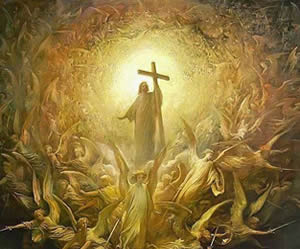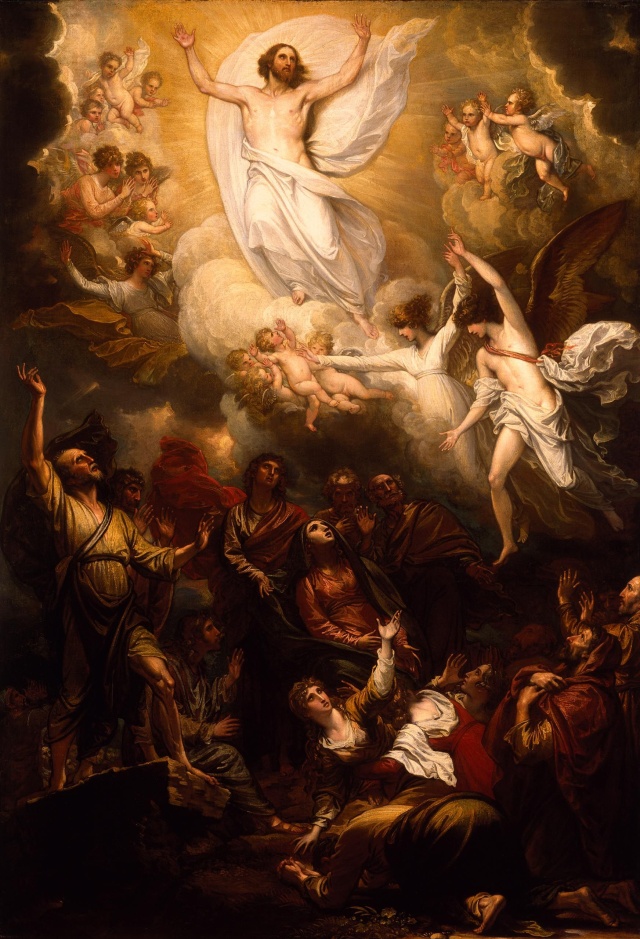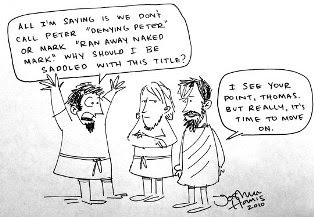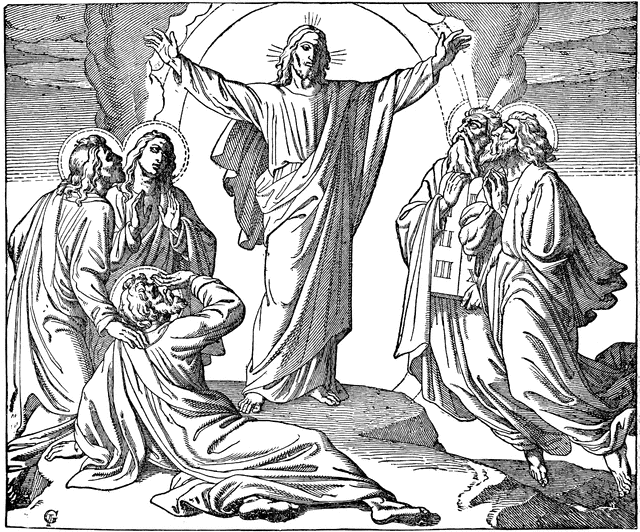Happy new year! The holidays have very much come and gone, gifts unwrapped, turkey and leftover Frankenstein turkey dishes eaten (turkey curry being a favourite of many), and lest I myself become overly relaxed by all the fun of the festivities, I’m returning to the only thing more awesome than tearing into yet another gift (that being to share Christ with my unbelieving friends!) So, let’s return again to my conversation with John, although, for people who haven’t read part one of our pagan parallels conversation, I’d strongly recommend reading, it’s found here. I know it’s a lengthy conversation, and for many they’d be reluctant to even begin, although I’m assuring you it’s worth a read, no matter your faith based or non-religious viewpoint, it’s seriously worth the effort.
To summarize: John Zande, atheist and writer behind the superstitious naked ape, has been boasting of a challenge they set to Christian believers, a challenge they claim to have been asking for years. Now, writing personally, years of asking the very same question, one which I thoroughly believed there was no answer to, as John believed, would be unbearably dull, so much so I’d probably stop asking the question altogether. John however finds asking this question so entertaining they have persisted in doing so for years.
So, what’s the question, the question goes something like: “Can you name something original Jesus either said or did?” That’s the big dilemma, seriously. Never mind how atheists asking are themselves presupposing the falseness of Christianity, or perhaps, the truthfulness of every religious figure ever, a position so incomprehensibly absurd for an atheist to hold it doesn’t bear thinking about. In fact, John could have answered the question himself, for if he had considered the truth of the Christian world-view, as another poster pointed out in part one, John and his unbelieving pals would have realized Jesus is described, in the Greek, as “monogenēs”, meaning unique, which today is ordinarily rendered as “only begotten”. Jesus isn’t merely the unique Son, They’re clearly one of a kind in Their role to bring healing to the nations, of course, the above can be dismissed by simply holding to A. the falseness of Christianity, or B. the truthfulness of everything else.
How did John’s presuppositions fair in our previous exchange? Not great, really poorly actually. With which I mused on the subject of education and life as an everyday student, let’s return there again. The first law in America to require general education was known as the Deluder Satan act, or the Law of 1647, which endeavoured to teach every child to read the Bible, moreover, of the first colleges established in the USA, 122 of the 123 were thoroughly Christian colleges. Harvard is an example of the above, once Christian, now secular, yet, their founders wrote: “Let every student be plainly instructed and earnestly pressed to consider well the main end of his life and studies is to know God and Jesus Christ which is eternal life.” (John 17.3)
Dave Miller explained further: “The Founders of Harvard believed that the central purpose of life is to follow the Word of God and Christ. They believed that all knowledge and learning depend upon this central pursuit. They believed that the Bible was the ultimate source of wisdom and knowledge. They therefore believed that life—rather than emerging by evolutionary processes over millions of years—was created by God, the Creator.” They continued furthermore: “They never would have dreamed that at the school they created a multi-million dollar project would one day be launched for the expressed purpose of ascertaining the origin of life. They surely never could have predicted the extent to which the university they created has strayed from its original purpose and principles. If they were alive today, they no doubt would insist that the faculty be dismissed or the university’s doors be closed.”
The above isn’t meant to be understood as a “gotcha moment”, if it were we would be just as bad as atheists and Muslims who read their ideology into an entirely unrelated history, rather, what the above should be noted as is meeting history where it was at, it’s getting to history as it was in their day. Enter (again) John “I’m too sexy for my hat” Zande, who, unlike earlier students of Harvard, can’t help reading history (even anybody’s cultural historic context) without inserting arguments from atheism into the mix. Got Greek myths? Well, they’re to do with the first century Jewish biographies of Jesus. And how about Egyptian and Hindus mythology, which many of my much loved Hindu friends dismiss as being enjoyable works of art and fiction, well, according to John, they’re somehow related to God’s being Triune, obviously. If by now you’re of the mind to write “John can’t just shoehorn such distinct cultures and contexts into one another, that’s like an anachronism! Or something.” You’ve realized that, I too have realized that, sadly however, John hasn’t.
John, by our last discussion, threw everything save the kitchen sink against accepting Jesus Christ as truly unique (historically speaking), they’re however floundering, as their tactics use “loaded language”, by which I’m meaning to write, when you don’t realize, or even refuse to accept, that concepts like revival, rebirth, reincarnation and resurrection are highly nuanced, you’re in danger of being dismantled point by point based upon their finer points of difference. Ignore nuances, especially those found in the Jewish context, at your own peril. Nonetheless, nuances only become part of conversation when that same conversation features nuanced and intellectually honest people, when you don’t have such writers contributing John can get away with their use of loaded language. My buddy John clearly isn’t used to, nor prepared for, conversations of an intellectually honest kind. They’re not intellectually honest, they’re not nuanced, they’re comic in their points, like an atheist meme generator. They use words relating to concepts, while trying to dismiss the distinctness of those very same concepts. “A helicopter?!” John begins: “Pfft! That’s just a fancy plane.” Well, no, no it’s not.
Now, I’ve answered John’s charge of unoriginality by three separate unique sayings of Christ, not merely by Christ’s uniqueness in and of Himself, for they demand either words or deeds. So, let’s read again my replies, after which we’re going to allow John their chance for rebuttal:
1. Jesus taught “Whoever eats my flesh and drinks my blood has eternal life, and I will raise them up at the last day.”
How many sages taught their true believers would have to eat their flesh and drink their blood or no life was in them?
2. “Verily, verily, I say unto you, Hereafter ye shall see heaven open, and the angels of God ascending and descending upon the Son of man.”
How many sages imagined themselves as the ladder dreamt by Jacob in Genesis 28:10-19?
3. “And now, Father, glorify me in your presence with the glory I had with you before the world began.”
How many sages claimed to be co-equal in authority with the God of Israel before the world began?

*John, Rae of Bookmark chronicles and Allallt on our discussions of faith, check those dialogues out, because in each there’s this “I no understand”, “I no speaka de English” defense. For the elect, you have to be prepared against so dishonest a reply.
[After dismantling John’s supposed pagan parallels to the life of Jesus, I’d produced a challenge of my own, namely, could an atheist offer up one parallel I couldn’t debunk as false. Let’s return to John’s answer to my challenge]: I’m sorry, but I don’t quite understand what your last question means.* I am by no means moving the goalposts. There is no trick here, and I apologise if you think there is. I assure you, there is not. I am simply asking whether there was anything genuinely new or original in anything the character, Jesus, said or did. For this we’re trying to focus only on the actual things said or done, rather than the theological flights of fancy, much of which are the imaginings of much later people. Of course, this doesn’t exclude these theological things, not entirely, but I hope you can appreciate that by addressing things like “promises” we’re off into an unquantifiable world. For example, the various storylines attached to dying and rising and resurrection matter not. What matters is the act (dying/rising/resurrection) is played out in other, older stories. That is the point. A point you seem to be having trouble grasping. Lemminkainen, for example, drowns, and is smashed to bits. His mother then stiches him back together and he returns to life. The manner in which Lemminkainen dies and is returned to life isn’t of concern. What is, is that he died and was resurrected.
Regarding Baal, here we have the Son of the Supreme God, El, who is killed, resurrected, and returns to earth to sit once again on his throne. If you want to read a quite detailed account of his death, resurrection and return, then I suggest this article: Death and Return of Baal: a reply to a near consensus <<< [Possible misspelling of the word “Resurrection” here, as the title might be “death and Resurrection of Baal”, since everything in John’s world is to be classed as the Jewish Resurrection of the dead]
http://vridar.org/2008/06/04/death-and-return-of-baal-a-reply-to-a-jz-ms-smith-led-consensus/ [Why John believed this rather uninspiring transcript helped their case is anybody’s guess, nonetheless, we’re going to, God willing, give it our attention later].
Now, as I’ve said, I can’t think of any sage who “promised” to come back, except for perhaps Avalokiteshvara who promised to return and is reborn in every Dalai Lama [citation needed]. I would, however draw your attention to the total absence of originality in what Jesus was actually promising. Judgment Day is found in the far, far older Zoroastrianism, as is the Saviour (the role it is said Jesus will play) who’ll oversee it and “renovate” the world.
OK, you’ve made some suggestions. Thank you.
1) “Jesus taught “Whoever eats my flesh and drinks my blood has eternal life, and I will raise them up at the last day.”
How many sages taught their true believers would have to eat their flesh and drink their blood or no life was in them?”
First up, only Catholics believe this, so it can hardly be considered a universal Christian thing, and I’m sure Evangelicals would have something to say about this. It is, however, nothing but a food ritual. Are you suggesting food rituals are unique to Christianity? Dionysus cults ritually consumed foods. Hellenistic mystery cults ritually consumed foods. In fact, the consumption of sacrificed animals was noted by Edward Carpenter as “…sufficient to show the extraordinarily wide diffusion of Totem-sacraments and Eucharistic rites all over the world.” There’s also the contention that Mithraism had the Eucharist before Christianity, although early church writers liked to accuse them of copying it [This coming from the man who uses Muslim history on the crucifixion].*

The concept, though, of sacrifice and consumption for the atonement of sin is anything but original. In Leviticus (4:35,5:10) we have: “The priest shall then offer the other as a burnt offering in the prescribed way and make atonement for them for the sin they have committed, and they will be forgiven.”
Replace the animal with Jesus and you have the exact storyline.
2) “Verily, verily, I say unto you, Hereafter ye shall see heaven open, and the angels of God ascending and descending upon the Son of man.”
How many sages imagined themselves as the ladder dreamt by Jacob in Genesis 28:10-19?”
Don’t you think this falls into the same ethereal category of the promised second coming? And how can it be truly original [if], as you say, the idea is found in Genesis? And isn’t the story of Osiris a mirror of this, in that he stands between the earth and the underworld? In Zoroastrianism the dead person’s spirit is escorted to heaven by the guardian spirit, Daena, where the spirit is shown their life (thoughts, words, and actions). An angel at the Chinawod Bridge would then determine if the dead person would go on to heaven, hell, or a third destination (purgatory) where it would wait until the Judgment Day. The idea of a gatekeeper is not new.
3) “And now, Father, glorify me in your presence with the glory I had with you before the world began.”
How many sages claimed to be co-equal in authority with the God of Israel before the world began?
I’m confused here as to what you’re suggesting. The bible has contradictory statements concerning this. Certainly, in John 10:30 we have Jesus saying “I and the Father are one,” yet then we have numerous occasions where Jesus says he’s not God:
Jesus said “But of that day and hour knoweth no man, no, not the angels of heaven, but my Father only.
John 13:3 the Father had given all things into his hands, and that he had come from God, and went to God.
John 7:16 Jesus answered them, and said, My doctrine is not mine, but his that sent me.
John 12:49 For I have not spoken of myself; but the Father which sent me, he gave me a commandment, what I should say, and what I should speak,
John 8:26 I have many things to say and to judge of you: but he that sent me is true; and I speak to the world those things which I have heard of him.
John 14:24 He that loveth me not keepeth not my sayings: and the word which ye hear is not mine, but the Father’s which sent me.
Either way, there are many Sons of God stories. Certainly nothing new or original there. Also, the idea of a Trinity (although never actually expressed in the bible) is anything but new. In the Egyptian ”Hymn to Amun” it’s written:
‘No god came into being before him (Amun)’ and that ‘All gods are three: Amun, Re and Ptah, and there is no second to them. Hidden is his name as Amon, he is Re in face, and his body is Ptah.’
In Hinduism, the trinity (Trimūrti, or The Three Forms) is of Brahma, Vishnu and Shiva. These three-in-one are called “the Hindu triad” or the “Great Trinity”
In the Hindu Puranas there is this passage:
‘O ye three Lords! know that I recognise only one God. Inform me, therefore, which of you is the true divinity, that I may address to him alone my adorations.’
In response, the three-gods-in-one (Brahma, Vishnu, and Siva [or Shiva]), replied,
‘Learn, O devotee, that there is no real distinction between us. What to you appears such is only the semblance. The single being appears under three forms by the acts of creation, preservation, and destruction, but he is one.’
In Babylon it was Nimrod, Semiramas, and Tammuz; within Israel pagan gnosticism it was Kether, Hokhmah, and Binah; In Plato’s philosophy it was the Unknown Father, Nous/Logos, and the world soul.
Listen, just to reiterate, there is no trick here. I’ll be happy to grant anything if it stands the test. It’s really quite simple: was there anything genuinely new or original in anything Jesus said or did. Was anything he said truly revolutionary? A while ago we thought we’d found something, Jesus cursing the fig tree, but as it turned out, in Hinduism is a similar event:
“Then Vac entered the trees; the gods claimed her but the trees refused to give her up; the gods cursed the trees”
That said, although falling under the general category of “miracles” (hardly original) Jesus turning the fish into an ATM machine does appear to genuinely original.
So, there’s one.


[Oh no, such powerful arguments, and from my own Scriptures too. Jesus isn’t God, the Trinity is Hindu, just extraordinary. Well, it would be, if it were true, which it’s clearly not. John was up to their old tricks again, more deception, could you, my Christian readers, have an answer strong enough to rebuff an atheist claim about Jesus’ divinity not being featured in the Gospel of John? Let’s read my reply hereafter]: My goodness, John, an awesome array of quotes misused and deformed beyond recognition. Was it too much to ask [you] to read the words surrounding the words you’ve quote? Let’s simply read the immediate context of the things you’re uncritically ripping into pieces, let’s see if you too come away with a better understanding of the Bible in context (very important to read in context).
You didn’t actually reference where you’d lifted the foremost of your quotes, nonetheless, the quote itself is a proof text for divinity: “But of that day and hour knoweth no man, no, not the angels of heaven, but my Father only.”
Your quote is actually a perversion, omitting the words “nor the Son” as my quotations hereafter are about to show, they’re from every place in which the saying is found and are historically confirmed as Jesus’ own words:
Mark 13:32 “But about that day or hour no one knows, not even the angels in heaven, nor the Son, but only the Father. Be on guard! Be alert! You do not know when that time will come.”
Matthew 24:36: “But of that day or that hour knoweth no one, not even the angels in heaven, neither the Son, but the Father.”*

Let’s just give you the benefit of the doubt, as opposed to thinking you edited the text to better suit your agenda. In saying no one knows the hour, neither the angels, nor the Son, Jesus is speaking in ascending order, explaining how the angels are above mankind, yet, Jesus then, in the portion you’ve somehow managed to delete from the above, places Himself above the angelic host! Jesus says they’re above the angels. Anyhow, considering you’re not bothered to reference where you’ve drawn the quote from, let’s begin by reading the surrounding context found in Matthew, by which we can find anything you’ve. . .missed:
Then will appear the sign of the Son of Man in heaven. And then all the peoples of the earth will mourn when they see the Son of Man coming on the clouds of heaven, with power and great glory. And he will send his angels with a loud trumpet call, and they will gather his elect from the four winds, from one end of the heavens to the other.
Who owns and commands the angels, John? Jesus claims the Son of Man, namely Himself, is going to command His angels, and that’s before placing Himself above the angelic host. Moreover, Psalms and Job are both great examples of who commands the angels:
If you say, “The Lord is my refuge,” and you make the Most High your dwelling, no harm will overtake you, no disaster will come near your tent. For he will command his angels concerning you to guard you in all your ways; they will lift you up in their hands, so that you will not strike your foot against a stone [Psalm 91:9-12].
God owns the angels, and Jesus too owns the angels, how interesting, not exactly the contraction you’d like it to be. Everything you’re quoting is meaning the exact opposite of the things you’re saying, extraordinary. You continued anyhow, quoting John 8:26, which reads “I have many things to say and to judge of you: but he that sent me is true; and I speak to the world those things which I have heard of him.”
One helpful suggestion, try reading verse 8:21, instead of ignoring the entire things and beginning with the portion you find most appealing:
Once more Jesus said to them, “I am going away, and you will look for me, and you will die in your sin. Where I go, you cannot come.” This made the Jews ask, “Will he kill himself? Is that why he says, ‘Where I go, you cannot come’?” But he continued, “You are from below; I am from above.
You are of this world; I am not of this world. I told you that you would die in your sins; if you do not believe that I am he, you will indeed die in your sins.” “Who are you?” they asked. “Just what I have been telling you from the beginning,” Jesus replied. “I have much to say in judgement of you. But he who sent me is trustworthy, and what I have heard from him I tell the world.”

“I’m from above” Jesus said, “I am not of this world.” Perhaps you simply missed these portions which are so very close to the things you’re quoting. You using the Gospel of John, of every Gospel, wasn’t a helpful thing to do if you’re hoping to undermine Jesus’ claims to being God. The more context that’s added just undoes everything you’ve been trying to convince people to believe, namely the overplayed narrative that somehow Jesus was just a nice man who said nothing controversial. My goodness, John 1:1 should have given you a hint as to what the author was meaning to convey! “In the beginning was the Word, and the Word was with God, and the Word was God.” There’s only one way to read John’s Gospel, and it ain’t how you’re reading, in fact, the very same chapter you decided to quote ends by saying:
Jesus replied, “If I glorify myself, my glory means nothing. My Father, whom you claim as your God, is the one who glorifies me. Though you do not know him, I know him. If I said I did not, I would be a liar like you, but I do know him and obey his word.
Your father Abraham rejoiced at the thought of seeing my day; he saw it and was glad.” “You are not yet fifty years old,” they said to him, “and you have seen Abraham!” “Very truly I tell you,” Jesus answered, “before Abraham was born, I am!” At this, they picked up stones to stone him, but Jesus hid himself, slipping away from the temple grounds.
No surprise then in other sections of John, readers find: Jesus answered them, “I showed you many good works from the Father; for which of them are you stoning Me? “The Jews answered Him, “For a good work we do not stone You, but for blasphemy; and because You, being a man, make Yourself out to be God,”
How about another, because you’re quoting from the [beloved] disciple after all, for which their love of God, and as a consequence truth, compelled him to write as much as they could about both Jesus the man, and the God. You used the following text as found in John 14:24: “He that loveth me not keepeth not my sayings: and the word which ye hear is not mine, but the Father’s which sent me.”
Try verse 4 and onward in chapter 14 (it’s the very same chapter), instead of ignoring direct claims which undo your preferences:
Thomas said to him, “Lord, we don’t know where you are going, so how can we know the way?”* Jesus answered, “I am the way and the truth and the life. No one comes to the Father except through me. If you really know me, you will know my Father as well. From now on, you do know him and have seen him.” Philip said, “Lord, show us the Father and that will be enough for us.”
Jesus answered: “Don’t you know me, Philip, even after I have been among you such a long time? Anyone who has seen me has seen the Father. How can you say, ‘Show us the Father’? Don’t you believe that I am in the Father, and that the Father is in me? The words I say to you I do not speak on my own authority. Rather, it is the Father, living in me, who is doing his work. Believe me when I say that I am in the Father and the Father is in me; or at least believe on the evidence of the works themselves.
Very truly I tell you, whoever believes in me will do the works I have been doing, and they will do even greater things than these, because I am going to the Father. And I will do whatever you ask in my name, so that the Father may be glorified in the Son. You may ask me for anything in my name, and I will do it.
Jesus as described by later authors as the “visible image of the invisible God” says “ask me for anything in my name, and I will do it.” which is of course accepting prayer, as was explained by several independent sources. John ends it best when they wrote “No one has ever seen God, but the only begotten God, who is in the bosom of the Father, He has made him known.” Again, “the only begotten God” There certainly are later writers who [found] material so unpalatable or scandalous that they [were] open to editing their findings, as you have already done, yet they [were] not writing divinity into Jesus words, rather they’d in many manuscripts change “begotten God” to “begotten Son” because they had been made so uncomfortable. Nonetheless, you’ve gone on to defend yourself when caught in other slips of the finger. . .repeated slips, even though you’ve been asking the question for years:“I am by no means moving the goalposts. There is no trick here, and I apologise if you think there is. I assure you, there is not.”
You used to write: “name anything new or original Jesus said or did.”
You’re presently writing: “Well, it’s a promise. Not sure if that actually counts while the promise remains unfulfilled.”
People reading can decide on whether or not you’re either a really really bad communicator, or something else.
You later insisted: “I am simply asking whether there was anything genuinely new or original in anything the character, Jesus, said or did. For this we’re trying to focus only on the actual things said or done, rather than the theological flights of fancy, much of which are the imaginings of much later people.”
We are referring to the Jacobs’ ladder verses and Jesus’ saying of eating His flesh and drinking blood in order to be saved, unless you can show these things were a latter addition to the Gospels, do stop making false claims, if you can however, please go ahead. . .you cannot. The simple fact that Jesus’ blood and flesh saying is historically attested, and practices surrounding the fact were being performed before the Catholic church even existed, strongly suggests they weren’t later developments.
Your continued message was undaunted: “Of course, this doesn’t exclude these theological things, not entirely, but I hope you can appreciate that by addressing things like “promises” we’re off into an unquantifiable world.” You don’t mean. . .the world of history?!😛 Again, in your own words: “So, we have Jesus purported words, and we have his purported actions. Somewhere in there was there anything, anything at all, that was genuinely new or original?”
The word “purported”, as you snidely used, is meant to explain it’s probably inaccurate, rather than something being reported, it’s purported to have happened, so, you’re hoping to find something original in even the purported words of Jesus, meaning you’re not even after words which weren’t a later invention by somebody else, due to which you later writing “we’re trying to focus only on the actual things said or done” means once again, you’re either incapable of using words how they’re meant to be used, or again are dishonestly moving the goalposts, readers are likely to decide. Speaking of not using words as they’re meant to be used, you’re avoiding the word resurrection in an awesome show of denial, once more:
You’re failing to discern, then even dismissing, the nuances in how the Jewish culture understood these miraculous acts. Christ is named “the first” fruit from the dead precisely because Their return wasn’t of the order of revival or revivification, rather Resurrection. For example, when Lazarus is raised again to life, he later dies, just as everybody who was raised would do, yet when writing in their letter to the Corinthians Paul states Jesus, by the resurrection body, is raised imperishable! [OSC: Three times I think I had to send this to John, they refused to reply to it in any noteworthy manner however].
Try facing up to the Jewish context, as an actual event, or in your eyes a purported event, it’s a one of a kind original claim/happening. You classing everything which remotely resembles returning after death as the Jewish resurrection is wilfully ignorant. An example of your own words: “The manner in which Lemminkainen dies and is returned to life isn’t of concern. What is, is that he died and was resurrected.” Considering you very much enjoy making laundry lists of out of context Bible quotes, try actually reading and understanding the material instead, by definition, to repeat, by definition, Lemminkainen was not Resurrected. You’re going to have to make your peace with that.
You continued, even defending your earlier Baal assertion: “Regarding Baal, here we have the Son of the Supreme God, El, who is killed, resurrected, and returns to earth to sit once again on his throne.”
I especially enjoyed the part where you avoided everything about the actual tablets of Baal as found in my previous post and continued on as if none of your claims have already been explained as faulty.🙂 The tablet contains no such event, you’re writing into the missing story the sort of content you’d like to be there, even worse than that you’re writing Jewish notions into a culture which had their own ideas. You’re also misusing the word resurrection (yet again).
With regards to the three suggestions I’ve made to you, you offered nothing in terms of a sage who asked their followers to drink their blood, instead used vague references to other food rituals, rather than face up to the substance of the claim. You tried to explain “Replace the animal with Jesus and you have the exact storyline.” meaning rather than truly finding parallels, as you’ve been unable to do, you’re instead searching for any elements, past, present or future, which are shared elements to the entire whole, after finding such a shared element, you then think you’re justified in dismissing something as unoriginal. You’re mistaken, to be original either means to be the first, as Jesus was by your purported standard, or merely to be not copying something or someone else, as you’ve already explained Jesus wasn’t doing.
As for Jacob and their ladder, as referenced by Jesus in Genesis 28:10-19, you wrote: “Don’t you think this falls into the same ethereal category of the promised second coming? And how can it be truly original is, as you say, the idea is found in Genesis?” If indeed it’s in the vein of the Second Coming quote, as Cat had already used to win gold, then that’s yet another original thing Jesus either said or did, fantastic.
“How many sages claimed to be the God of Israel?” Was my very simple question to you, and you’ve failed to answer, instead you went into a full blown fib fest, aimlessly and poorly attacking the divinity of Jesus rather than simply face the substance of the claim. Making claim to be Thor isn’t to say you’re the God of Israel, saying you’re Zeus, who would become a swan etc, isn’t the same as someone saying they’re the God of Israel, Jesus, by our use of the historical method, has been shown to have made these claims, if as it appears nobody else has claimed to be the God of the Jewish people before Christ, then there’s yet another original claim, one of many many original claims and deeds. You finding other gods in the history of forever doesn’t make such a claim unoriginal.
You’ve saved your most interesting misstep until last however, writing how Brahma, Vishnu and Shiva somehow harm the originality of the Trinity. Writing “O ye three Lords! know that I recognise only one God. Inform me, therefore, which of you is the true divinity, that I may address to him alone my adorations.” Concluding, in your words how the “three-gods-in-one” makes the Tri-personal God of the New Testament unoriginal.*

Hindu gods (and goddesses) assemble!
Hindu views of the divine are in fact pantheistic, regarding the universe and everything within it (which includes your example of three) as an offshoot or expression of the impersonal ultimate. It’s the element in Hinduism which renders everything as in some wise belonging and being an expression of the impersonal divine force which allows for three supposed demigods to reply as if to say they’re one. They’re however mere emanations of the one impersonal force.
The three-in-one-gods are not truly gods in the least, rather they’re one substance, whereas in the case for Christ the three aren’t three gods but three persons, yet the Hindu ultimate is impersonal! (No persons). You’re claiming the impersonal endangers the originality of the personal, and that writers who copy Jesus harm Jesus’ originality, or anything anywhere even though they’re totally unrelated to the Gospels harm their originality. Merely due to reading the English word three you falsely imagine it’s somehow endangering the Trinity’s originality, imagine after having heard of the tri personal God someone started babbling: “Ah three, ah ah three musketeers, the three stooges, umm three. . .free. . .free willy!” The number three being involved in something doesn’t harm the Trinity.
Readers can only guess at John’s reaction to my reply, I’d imagine it would’ve gone something like so: “Oh damn, has this guy actually read the Bible? But it’s so long!” Their reaction aside, John, as we’re about to find for our third and final section, doesn’t continue their attempts at undermining the divinity of Christ, not by anything tangible anyway, rather they stay entirely clear of Scripture. Their previous use of Scripture however, that’s been shown to be wholly inaccurate, with which, for John personally, I’d like to share a poem from Amos R. Wells:
I supposed I knew my Bible
Reading piecemeal, hit and miss,
Now a bit of John or Matthew,
Now a snatch of Genesis,
Certain chapters of Isaiah
Certain Psalms (the twenty-third!);
Twelfth of Romans, First of Proverbs—
Yes, I thought I knew the Word!
But I found that thorough reading
Was a different thing to do,
And the way was unfamiliar
When I read the Bible through.Oh, the massive, mighty volume!
Oh, the treasures manifold!
Oh, the beauty of the wisdom
And the grace it proved to hold!
As the story of the Hebrews
Swept in majesty along,
As it leaped in waves prophetic,
As it burst to sacred song,
As it gleamed with Christly omens,
The Old Testament was new,
Strong with cumulative power,
When I read the Bible through.Ah! Imperial Jeremiah,
With his keen, coruscant mind;
And the blunt old Nehemiah,
And Ezekiel refined!
Newly came the Minor Prophets
Each with his distinctive robe,
Newly came the Song idyllic,
And the tragedy of Job;
Deuteronomy, the regal,
To a towering mountain grew,
With its comrade peaks around it,
When I read the Bible through.What a radiant procession
As the pages rise and fall,
James the sturdy, John the tender
O the myriad-minded Paul!
Vast apocalyptic glories
Wheel and thunder, flash and flame,
While the church triumphant raises
One incomparable Name.
Ah, the story of the Saviour
Never glows supremely true
Till you read it whole and swiftly,
Till you read the Bible through.You who like to play at Bible,
Dip and dabble, here and there,
Just before you kneel, aweary,
And yawn thro’ a hurried prayer;
You who treat the Crown of Writings
As you treat no other book—
Just a paragraph disjointed,
Just a crude, impatient look—
Try a worthier procedure,
Try a broad and steady view;
You will kneel in very rapture
When you read the Bible through!
Atheist think they know their Bible, borrowing from anti-trinitarian (or Muslim) talking points, when they’re confronted by more clear and thorough a reading however, their carefully crafted falsehood is simply undone, in fact, to continue to hold to John’s reading of the Gospel narratives in spite of the clear authorial intention which went against their assumptions, that’s just to be wilfully ignorant. I can’t in good conscious behave how John does. For believers reading however, you have to realize, atheists aren’t going to read Scripture in context, they’re not interested in an understanding of what’s been written, either by the author of one book or by the Bible as a whole, it’s in their eyes undeserving of their attention, it’s undeserving of a fair viewing, they’re not interested in how the narrative unfolds in any way, shape or form, their minds are made up. They’re just gonna shred it up, tear it down and move on, you’ve got to be prepared for that level of dishonesty.
The writers of the New Testament material, in addition to people like Ignatius, whose material wasn’t even included, lived as experiential trinitarians, that’s true of their teachings no matter the lens through which you’re reading, that’s how the earliest teachings about Jesus pan out. In fact, the earliest heresy as found in the region didn’t question Jesus’ divinity, it brought into question His humanity. There’s the famous illustration which early heretical groups imagined, in which Peter walked along the seashore with Christ, only to turn and look upon the path the pair had walked, seeing then only one set of footprints (Peter’s). For which New Testament writers wrote “This is how you can recognize the Spirit of God: Every spirit that acknowledges that Jesus Christ has come in the flesh is from God,” Debates weren’t raging about whether or not Jesus was or wasn’t God amidst various believers in His ministry, rather they had been debating whether Jesus had truly suffered as God or God-man, was Their passion merely the illusion of hurt, or genuine pain, that’s how impactful Their life was and is. The transfiguration, John explaining how it was Jesus who Isaiah saw high and lifted up in the Temple, the material, both explicit and implicit, goes on and on, in fact, in a study of my own, I can share with you how there are more points alluding to the divinity of Jesus in the gospel of Mark than there are chapters in Mark! For believers however, let’s open again our gospels, in which Christ said:
“Do you now believe?” Jesus replied. “A time is coming and in fact has come when you will be scattered, each to your own home. You will leave me all alone. Yet I am not alone, for my Father is with me. I have told you these things, so that in me you may have peace. In this world you will have trouble. But take heart! I have overcome the world.” After Jesus said this, he looked toward heaven and prayed: “Father, the hour has come. Glorify your Son, that your Son may glorify you. For you granted him authority over all people that he might give eternal life to all those you have given him. Now this is eternal life: that they know you, the only true God, and Jesus Christ, whom you have sent. I have brought you glory on earth by finishing the work you gave me to do. And now, Father, glorify me in your presence with the glory I had with you before the world began.”
Yet in Isaiah we read God won’t nor has ever shared in Their glory (Isaiah 42:8): “I am the Lord; that is My name. And My glory will I not give to another, neither My praise to graven images.” Oh no, atheists shout, reading comprehension is breaking down, there must be a Bible nearby! Come on, guys, stop being coy, read the Bible like an adult, not a cult member. This is the verdict: We’re either enlightening ourselves unto salvation, John, or I’m storing up wrath for you in Heaven, because God’s will is done, be it done by you and I realizing He is God, and recognizing how badly our actions have harmed Him, even harming ourselves in the process, with which we repent of our often ill spent lives, or we’re simply satisfying God’s perfect justice by which evil is punished. Why rebel against God, how does an atheist gain in doing so, perhaps you’ve gained freedom enough to make really poor arguments online, oh man, let me at some of that freedom, I can’t wait to go online and get schooled by educated believers while I’m poorly misquoting the Gospels. That’s the freedom, that’s your prize, never mind atheism and materialism imply determinism, which means you’re a molecular machine who chooses nothing as there’s simply no choice.
I’ve gone through the very tedious task of debunking John’s every pagan parallel, their misquoted Bible verses, their every argument, and how many people have honestly stayed around to read up and further understand our discussion, despite having around thirty likes per article as of today, who’s to guess how many people are actually reading or lurking the content. John’s material was punchy, even taking seconds to make their “points”, while for you and I to disprove their absurd method and failed arguments takes pages and pages of critical observation. To overthrow the unstated presuppositions, which go unstated because they’re so weak, is a lengthy process. How many people really stayed the course? Let me know in the comments below. Nonetheless, what do readers who have braved our conversation full fold believe, does John’s once mighty list of Bible misquotes convince you, how about their pagan parallels, insofar as I’m concerned, methinks John is probably still suffering from a little PTSD after having engaged an educated believer.

― T. C. M


LikeLiked by 1 person
Thank you, GP. It’s as always a treat to read from you!
LikeLiked by 1 person
It was through reading your first instalment and something else posted by another person I follow that prompted me to compose a post of my own entitled ‘A Message of Peace from an Atheist’. This John Zande sounds like nothing but a trolling smart arse and I do hope you know that not all atheists are as narrow-minded and pompous as that particular variety of dickhead! Please don’t use him and his friends as a benchmark because I assure you that most of us aren’t like that at all. I hope you’ll take five to read my post and that it sheds some light if you do.
All the best to you for 2017 by the way 🙂
LikeLiked by 1 person
That’s really important for readers to realize, Paul. Not everybody is so lame as John, it’s the internet for crying out loud, we’ve got to take these people with a pinch of salt. And being in the UK, London no less, the vast majority of the people I’m dealing with day to day are atheistic in outlook, that’s not to say they’re depraved, or manic or so obnoxious as John, they’re just people working their jobs, riding the tube, living life. Atheism, relativism, these things, especially for how they’re marketed, have tremendous draw for people, especially I’ve found for young men. Your article was an interesting appeal, much of which I’m in total agreement with, however, it’s when you share a call for civility, one grounded in the fact that“we’re all human”, or “we’re all people”, it’s then that I’m of the mind to ask “What is a human?” For it’s the answer to that question which would truly inform our behaviour towards one another, it was an important question to me too.
I notice in the comments we’ve both enjoyed listening to Stephen Fry too! For which, I’d like to direct you to a three part conversation I’ve had with an atheist blogger named Alex Black, although only in part one do both myself and Alex go into the Fry interview. It’s an old one, so old I’m still writing my words in bright red (Err, what was I thinking 😛 ). I’d appreciate you having a read, my friend. Rereading it I’ve touched upon a few interesting questions which you’ve raised by your own post.
LikeLiked by 1 person
Always happy to be educated 🙂 I’ll give it a look over shortly. On your “we’re all humans” point, I think some of us are more human than others. Or should that be humane?
Anyway, I’ll give your post a read and thank you for taking the time to read mine 🙂
LikeLiked by 1 person
Man, 2017 has started off with some awesome messages, really very constructive. Anyway, write me back with your thought on my exchanges with Alex, either after reading conversation one, or all three, as it’s an interesting one.
LikeLiked by 1 person
I’ve read part one (took me over an hour, but I got there). I’ll definitely catch up with parts two and three in due course. Mind blown!
LikeLiked by 1 person
http://www.equip.org/article/contemporary-atheists-sneer/
LikeLiked by 1 person
As the traffic to the blog increases, I’m really noticing these sorts of posters arrive, they’ll simply write their piece, their two cents, and they’re off, “Peace out.” At which point I’m saying to myself “that’s not peaceful!” They’re just out to vent or play at word games or who knows, I’m only glad in that dismantling John can serve as an encouragement to believers and those who can accept God’s gift of grace, and that’s worth every minute I spent in conversation with him. A really interesting article you’ve shared too, I’m about halfway through.
LikeLiked by 1 person
I’ve only read this one so far, but I will def read the other(s?). It is thoroughly enjoyable.
I’m sure you realize that the one who’s too sexy for his hat will receive complete and relevant responses but will continue to trip blithely through many a blog and re-pose the question as though no answer has been up to the challenge.
I adore your illustrations and pix.
LikeLiked by 1 person
I especially liked the “We don’t call Mark ‘run away naked Mark’” picture. 🙂 I wouldn’t be surprised if John continued posting their not so great challenge to others, hoping perhaps to find someone not as sure in their faith. In my mind, their behaviour takes on a whole new dimension when we see it as not merely dishonest, but cruel, it’s cruel to try and mislead God’s beloved creation by writing the kinds of things John writes. He’s not happy being godless himself, but wants that for you and I also, he’s not comfortable visiting my blog, despite the fact I’ve already wished him a happy Christmas and linked him to part one of this conversation, 😉 yet I’m willing to bet he’s comfortable going to less educated believers and hounding their poor souls (as I’ve seen him do). A bad, sad man.
LikeLiked by 1 person
I especially enjoyed reading a few years ago where people tried to draw parallels between Jesus and Mithras. They were evidently hoping that none of their readers would do the research for themselves, because it falls hilariously flat if you do. Jesus is immensely unique – and utterly necessary,
LikeLiked by 2 people
Oh man, don’t, I’m going to spill my cereal over here. I so loved the “Mithras was born of a virgin” bit, because everybody does the joke altogether, it was like panto. “Mithras was born of a virgin!” Everyone goes away and finds out Mithras came out of a mountain, then we all shout together “Was the mountain a virgin?!” Ain’t nobody walked her virgin footpaths I tells ya.
LikeLiked by 2 people
OSC, you’ve made so many fine points here, and you haven’t been satisfied to simply rebut or to win arguments, though you’ve been refreshingly bold about that, giving JZ the respectful adult challenge, man-to-man. You’ve drawn the proper conclusions and given opportunity to reconsider in light of the truth. Bravo.
LikeLiked by 1 person
In my case, I’m often on the “winning” end of an argument, however, I’ll look back and wonder if I really went about it in the right way. Couldn’t I have worded something better, or showed more love, had less of a reaction to certain points, waited longer to reply, been more nuanced, been less nuanced! Had I let myself down in the way I’d shared my love of Christ, or had I made the promises of God unattractive somehow, yet, in the case of my conversation with John, I went away very very satisfied with our exchange. I think it was the kind of reply that reached him, a lot more so than dry scholarship or a heartfelt appeal. Thank God for the words to turn hearts.
In the new year, you might be interested to read, I’m actually preparing a companion website to go alongside OSC, in fact, I’ve been working on the site as early as yesterday! Thankfully I’m taking about a week off from work in which to get some rest and relaxation, then prayerfully consider the kinds of articles I’m going to first upload (an examination of Isaiah chapters fifty-two and fifty-three being one I’ve got my heart set on). I’ll keep updating OSC weekly, of course, but my new site, I’m thinking, will be exclusively for my own content, so I can be a lazy poster over here, with the odd video, shared essay and so on, whereas over there I’ll be adding original essays and the like in PDF format. I’m thinking, and this may just be due to where I’m from, it seems as though simply writing an article about what the Bible actually teaches, or the story of Christ, would be needed before anything else, it’s seeming to me many of my friends in nominally Christian England aren’t familiar with what the Christian viewpoint actually is, so for me to write on say the inner witness of the Holy Spirit, or theories of how people discern knowledge, might to the classic example of giving babies anything other than milk. Anyway, I’m really excited about the site!
LikeLiked by 1 person
You should be excited! Can’t wait to see it!
LikeLike